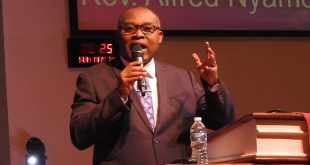
Photo Caption: Pastor makes congregation eat grass
What is the current state of the Church in Africa? Is it good, honourable, positive, influential, attractive or it is otherwise? Is the Church losing its influence on society? Who is responsible for the current condition of the Church? Is it pastors, church members or critics?
An honest observer will boldly admit that the Church in Africa is currently weakening. He will answer the third question in the affirmative, and add that the Church is in a serious crisis. He will finally blame church leaders for being responsible. In one of his books, Bishop Dag Heward-Mills wrote, “leadership is everything, and everything is leadership.”
Church leaders are responsible for the success or the failure, the positive image or the negative image of the Church. The Church in Africa rises or falls on leaders who shepherd it. Christ Jesus appoints leaders to serve the Church by God’s Word and Spirit. They are stewards. This is why church members honour and appreciate them.
However, we live in an era in Africa where so many people, including believers are losing interest in the Church. They are becoming faithless, and are falling away, backsliding or returning to the world. We should not think their action is the fulfillment of the apostasy prophesied in the Bible (2 Thessalonians 2:3).
This rejection of the Church for the world, especially for the African Traditional religion, in recent years, is mainly the consequence of the evils many church leaders have committed, and continue to commit in ministry without repentance.
Many church leaders have replaced the preaching of the gospel of Jesus Christ with prosperity gospel or motivational messages, which only appeals to people’s intellects and emotions. This has denied many people true salvation of their souls in Christ Jesus.
Others distort the truths of God’s Word when they tell people to pay money to receive the anointing of the Holy Spirit, healing, deliverance, breakthrough and other blessing of God.
However, after giving the money, the believers do not receive the expected blessings, thereby making God a liar when He is truth. They ignore the truth that as they have freely received from God, they must also freely give (Matthew 10:8).
Moreover, most Church leaders practise man-made traditions, including hierarchical titles of nobility and pastoral garments, which have no basis in Scripture. These traditions serve no purpose in advancing the gospel except to create an evil culture of clericalism in the Church.
This has led to the division of the Church into clergy and laity when doctrinally all believers are God’s clergy and all are His laity. It is for this division that many baptized believers have relegated their ministries to the background, doing nothing with their spiritual gifts and natural talents for the advancement of the gospel.
Indeed, this is evil and must be stopped. Jesus Christ says all His disciples are brothers and sisters (Matthew 23:8). In other words, though some have been appointed to serve as leaders, we are all one by virtue of our common faith, baptism and salvation. Leaders must be regarded as stewards who will have to give accounts (1 Corinthians 4:1).
Another area where many Church leaders in Africa are criticized is financial recklessness. Many pastors, especially those in the Penteco-Charismatic churches, consider the churches they have established, as their private businesses. Many, therefore, use church funds for their personal needs without accounting to anyone.
In fact, there are several other evils church leaders in Africa commit which time will not permit me to write about. Now, what happens when revered church leaders who are expected to live above reproach, abuse their offices and refuse to repent from their evil ways?
Certainly, people will be discouraged and distrust pastors; eventually they may leave the Church and begin to attack them. These are not attacks without cause, but attacks for wrongdoing. Of course, church leaders are humans who are also tempted to make mistakes.
But we church leaders should always learn to show maturity, and repent when we commit evil. We should not be defensive and argumentative when our wrongs are exposed. Unfortunately, this is exactly what many of us do when we sin. We resent correction and rebuke because of pride.
This attitude could be influenced by how some church leaders are trained. Father Peter Daly, in an article, points out that “clerics are often trained to think they are set apart from and set above everyone else in the church. Their word is not to be questioned. Their behaviour is not to be questioned. Their lifestyle is not to be questioned.
He continued, “they rule over the church as if they were feudal lords in a feudal society. That is how they see themselves – lords of the manor, complete with coats of arms, titles of nobility and all the perks that go with “superiority.”
Now, there is one main thing God expects of those who sin: we must not read or hear to defend. We must humble ourselves, genuinely repent from our sins, and return to God with renewed commitment to serve our generation as Jesus Christ and the earliest apostles did for the glory of God.
We must return to the preaching of the gospel of salvation and disciple-making. Leaders must put in place pragmatic measures to ensure transparent financial accountability. We must give up unbiblical traditions that promote divisions in the church. Leaders must be trained to understand servanthood, not lordship. Finally, leaders must equip and encourage church members to use their spiritual gifts.
Africa has a great destiny in God’s plan. If pastors repent and return to the true gospel, the Church in Africa can once again become a light to critics and nations. There will be massive revival when leaders humble themselves, members rise to serve, and together, we lift Christ above traditions, titles, and personal ambitions.
By James Quansah
 clcgh.org Building The Capacity Of Christian Leaders, Equipping The Saints For The Work Of Ministry, Redirecting Straying Christians To The Sound Knowledge Of Christ
clcgh.org Building The Capacity Of Christian Leaders, Equipping The Saints For The Work Of Ministry, Redirecting Straying Christians To The Sound Knowledge Of Christ



